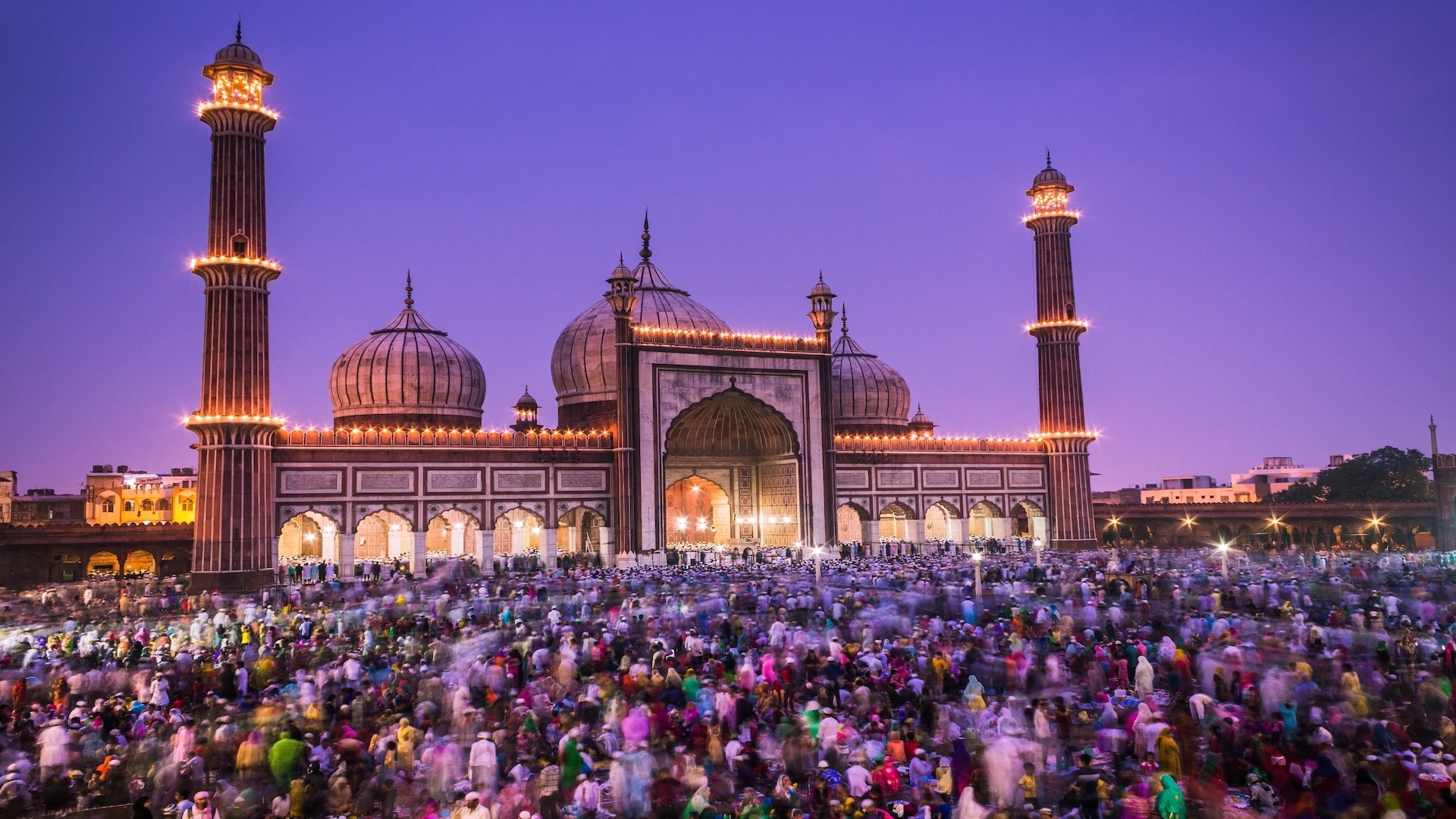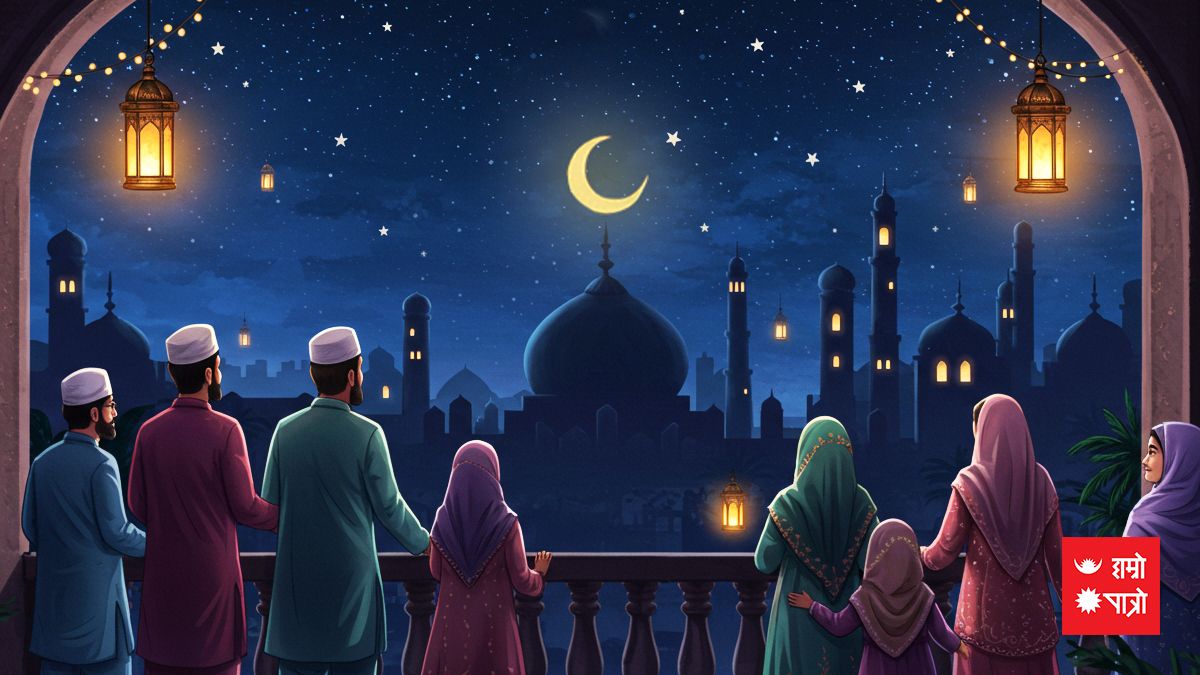Eid al-Fitr (Festival of Breaking the Fast) is one of the two main festivals in Islam. It falls on the first day of Shawwal, marking the end of the month-long dawn-to-dusk fasting (sawm) of Ramadan. The holiday is celebrated by Muslims worldwide.
 Congregational prayer at Jama Masjid, Delhi.
Congregational prayer at Jama Masjid, Delhi.
Eid al-Fitr has a particular salah that consists of two rakats generally performed in an open field or large hall. It may only be performed in congregation (jamāʿat) and features six additional Takbirs (raising of the hands to the ears whilst reciting the Takbir, saying "Allāhu ʾAkbar", meaning "God is the greatest"). In the Hanafi school of Sunni Islam, there are three Takbirs at the start of the first rakat and three just before rukūʿ in the second rakat. Other Sunni schools usually have 12 Takbirs, similarly split in groups of seven and five. In Shia Islam, the salat has six Takbirs in the first rakat at the end of Tilawa, before rukūʿ, and five in the second. Depending on the juristic opinion of the locality, this salat is either farḍ or mustaḥabb. After the salat, Muslims celebrate the Eid al-Fitr in various ways with food being a central theme, which also gives the holiday the nickname "Sweet Eid" or "Sugar Feast".
History and General Rituals
 Celebration after the conclusion of Eid prayer.
Celebration after the conclusion of Eid prayer.
According to Muslim tradition, Muhammad instituted the celebration of Eid al-Fitr. According to a certain hadith, these festivals were initiated in Medina after the migration of Muhammad from Mecca. Anas ibn Malik, a companion of Muhammad, narrated that when Muhammad arrived in Medina, he found people celebrating two specific days in which they entertained themselves with recreation. Muhammad then remarked that God had fixed two mandatory days of festivity: Eid al-Fitr and Eid al-Adha.
Eid al-Fitr begins at sunset on the night of the **first sighting of the crescent moon**. The night on which the moon is sighted is celebrated as **Chand Raat** in countries like Bangladesh. If the moon is not observed immediately after the 29th day of the previous lunar month, then the holiday is celebrated the following day. Eid al-Fitr is celebrated for one to three days, depending on the country. It is **forbidden to fast** on the Day of Eid, and a specific prayer is nominated for this day. As an obligatory act of charity, money is paid to the poor and the needy (**zakat al-Fitr**) before performing the 'Eid prayer.
The Eid prayer is followed by the khutbah (sermon) and then a dua (supplication) asking for God's forgiveness, mercy, peace and blessings for all living beings across the world.
The Eid Prayer (Salah) Procedure
The Eid prayer is performed by the congregation in an open area such as a field, community center, or mosque. No call to prayer is given for this Eid prayer, and it consists of only two rakaʿāt, with a variable amount of takbirs and other prayer elements depending on the branch of Islam observed. The sermon of Eid takes place **after** the Eid prayer.
Sunni Procedure
1. The prayer starts by doing niyyah (intention) before the takbir is said by the imam.
2. The **takbir al-ihram** is performed, followed by saying takbir **three times** (raising hands to the ears and dropping them each time), except for the last when the hands are folded.
3. The Imam then reads al-Fatihah, followed by another surah. The congregation performs ruku and sujud (completes the first rak'ah).
4. In the second rak'ah, the imam recites al-Fatiha followed by another surah.
5. **Three more takbirs** are called out just before the ruku.
6. The rest of the prayer is completed regularly, followed by a khutbah (sermon).
Shia Procedure
1. The prayer starts with the Niyyat.
2. This is followed by **five Takbirs** in the first Rakat. During every Takbir of the first rakat, a special Dua is recited.
3. Then, the Imam recites Sūrat al-Fātiḥah and Surat Al-'A`lá and the congregation performs Ruku and Sujud.
4. In the second Rakat, the same above steps are repeated (five Takbeers, Sūrat al-Fātiḥah and Surat Al-'A`lá, Ruku and Sujud).
5. After the prayer, the Khutbah (sermon) starts.
Post-Prayer Celebration
During the Eid celebration, Muslims greet each other by saying **'Eid Mubarak'** (Arabic for "Blessed Eid"). As it comes after a month of fasting, sweet dishes and foods are often prepared and consumed during the celebration. Muslims typically decorate their homes, and are also encouraged to forgive each other and seek forgiveness. In countries with large Muslim populations, it is normally a public holiday with most schools and businesses closed for the day. Practices differ by country and region.